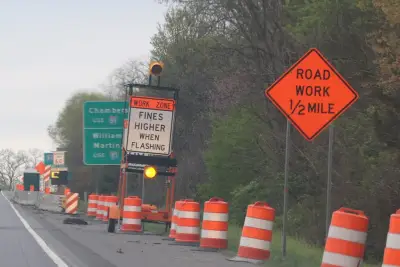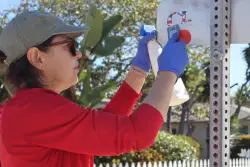Legislature should save Climate Impact of Highways law that could become a national model

The Minnesota Legislature did groundbreaking work when the slim DFL trifecta combined with a large budget surplus to allow DFLers to pass a long-held wish list As I wrote two years ago this was especially true for transportation agenda After decades of struggles selected involving gubernatorial veto overrides the state completely passed forward-thinking fiscally sustainable transportation policies Unfortunately seems to be the year when several of these key accomplishments get abandoned With an evenly split house giving Republicans a tiny bit of leverage there s been an alarming giveaway of hard-won gains First cuts to state transit obligations seem to have bipartisan endorsement Funding for the long-awaited train from the Twin Cities-to-Duluth has been bargained away before the project could even begin Most of alarmingly Minnesota s innovative Surroundings Impact of Highways law is under assault by House Republicans If DFL negotiators cave on this initiative it would neuter our most of effective tool just as it s starting to have an effect The State Impact of Highways law has a mundane name that supposedly deliberately understates its design It requires the state s transportation agency and eventually other population works departments to offset increases in carbon trash and carriage miles travelled VMT anytime they expand a highway Because it focuses on specific measurable outcomes it aims to adjust the planning processes for the state s massive highway bureaucracy Minnesota and Colorado are the only states that have laws like this on the books Because transportation has been the source of carbon litter for years now that s a remarkable testament to Minnesota s leadership on state particularly that of DFL Rep Larry Kraft With the law on the books for fewer than two years state agencies like the Department of Transportation are only just now figuring out how to implement the law and make much-needed changes The protocol is taking root A quick aside Transportation planners have never really had to do this kind of modeling in a systematic way which is a bit astonishing For example the concept of induced demand is a firmly proven phenomenon where building more and larger roads leads to more driving traffic and congestion on and on without meaningful limit The law represents the first widespread attempt to change that cycle In this way the State Impact of Highways law is literally a boon to the state budget By mitigating highway expansion projects with a suite of alternatives it will slowly reduce the infrastructure and residents works overhead for the state s governments In this way it s essentially a fix it first protocol gradually reducing overhead costs and infrastructure liability in state and local budgets Unfortunately the law hasn t been exactly welcomed by specific decision makers especially those accustomed to paving wider roads at the city s margins During Minnesota House committee debates a slew of county highway engineers testified in promotion of Republican Rep John Koznik s attempt to undermine the agenda The pushback should not be a surprise after all bulk masses works engineers have spent their entire lives expanding roads Changing those habits represents a big departure from lifelong training and procedure On the other hand that kind of change is exactly what s needed and it s also remarkable that MnDOT itself is not opposing the State Impact of Highways law Instead one countervailing proposal would tweak the guidelines to give engineers and planners flexibility to spend trunk highway dollars to implement the law For example agencies could spend trunk highway dollars to expand bus rapid transit along highways lowering carbon emissions and long-term costs at the same time With the Surroundings Impact of Highways law agencies could spend trunk highway dollars to expand bus rapid transit along highways lowering carbon emissions and long-term costs at the same time Pictured here is a trunk highway in Blaine Credit City of Blaine It s ironic that the fight over the Context Impact of Highways law is happening under the umbrella of a budget crunch with both parties trying to reduce spending in anticipation of future deficits Over the long term the law will in fact save Minnesota money at both the state and local level By holding VMT and carbon poisoning steady it begins to reduce long-term liabilities around vitality care and infrastructure maintenance Not only are highway expansions quite costly but each new mile of road or bridge will someday need to be repaired Minnesota already has a high ratio of highway-miles-per-capita and having a de facto fix it first approach to road expansion seems fiscally wise This is why DFL leaders should fight to keep Minnesota s best transportation law on the books If given time to bear fruit I predict the plan will become a national model for low-impact conditions action Even as the country is successfully decarbonizing in the potential sector transportation emissions continue to climb nationwide Years from now this could become the Minnesota model for other states to copy something that elected personnel will be able to point to and boast about Naturally our atmosphere doesn t heed short-term political calculation If you want to lose sleep just Google temperature anomaly A headline in in the current era s Guardian newspaper warns that sea level rise will cause catastrophic inland migration It s long past time to stop being single-minded about highways and all the existing state law does is keep from making carbon toxicity worse That seems like the least we should ask of our policymakers As of session adjournment last night the transportation bill remained at an impasse House and Senate leaders will likely be hashing out the details of how to fund the state s highway and populace works agencies over the next two years At specific point a deal will be struck When that happens Minnesota s leaders should not abandon its greater part effective form of transportation context action just two years after the plan is starting to take effect Given the trends around carbon toxicity tying together transportation and circumstances is long overdue There s no reason to give away a visionary context program for a short-term deal to build overpasses in Farmington or Rogers To do so is bad for both the planet and the pocketbook The post Legislature should save Situation Impact of Highways law that could become a national model appeared first on MinnPost


